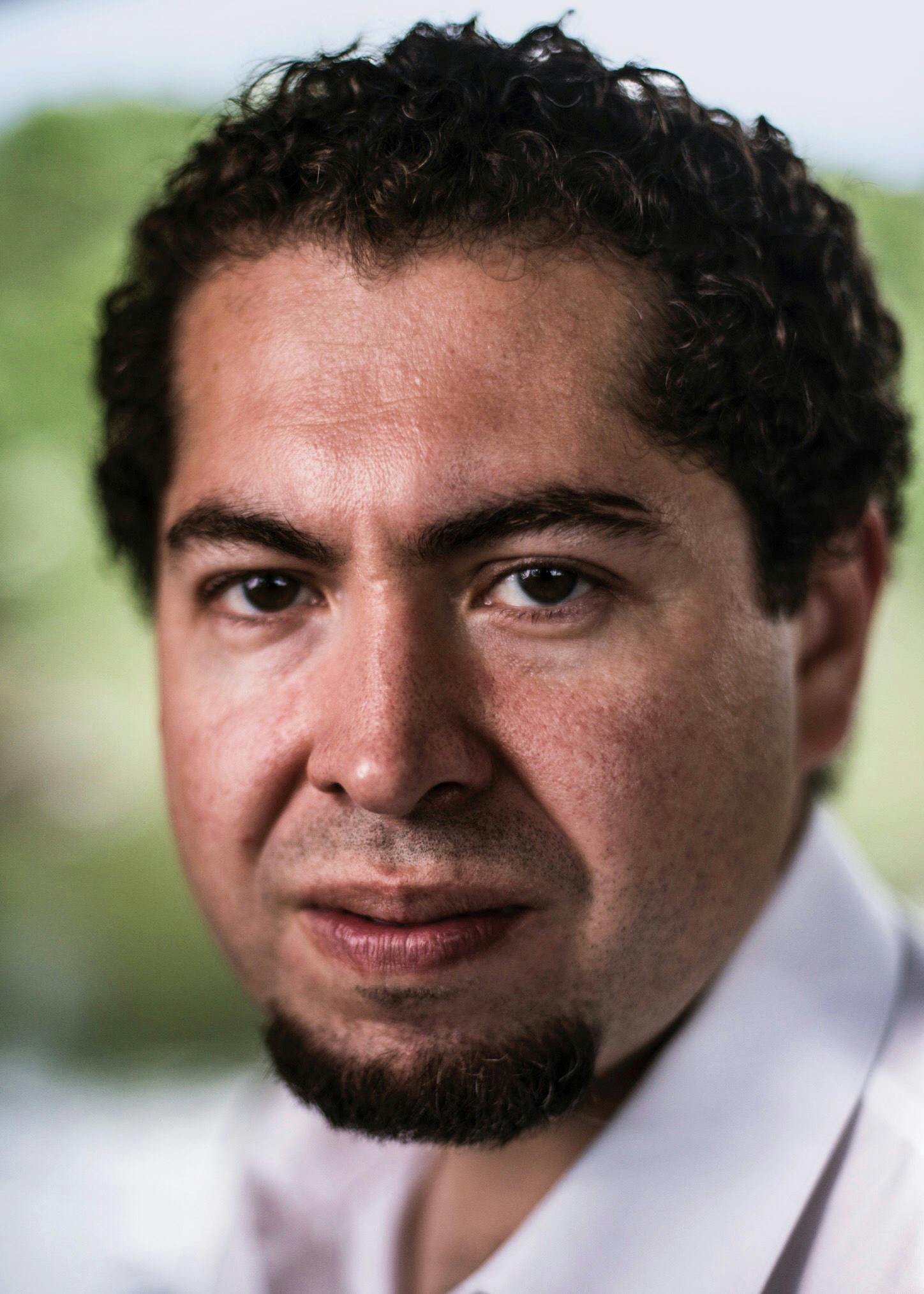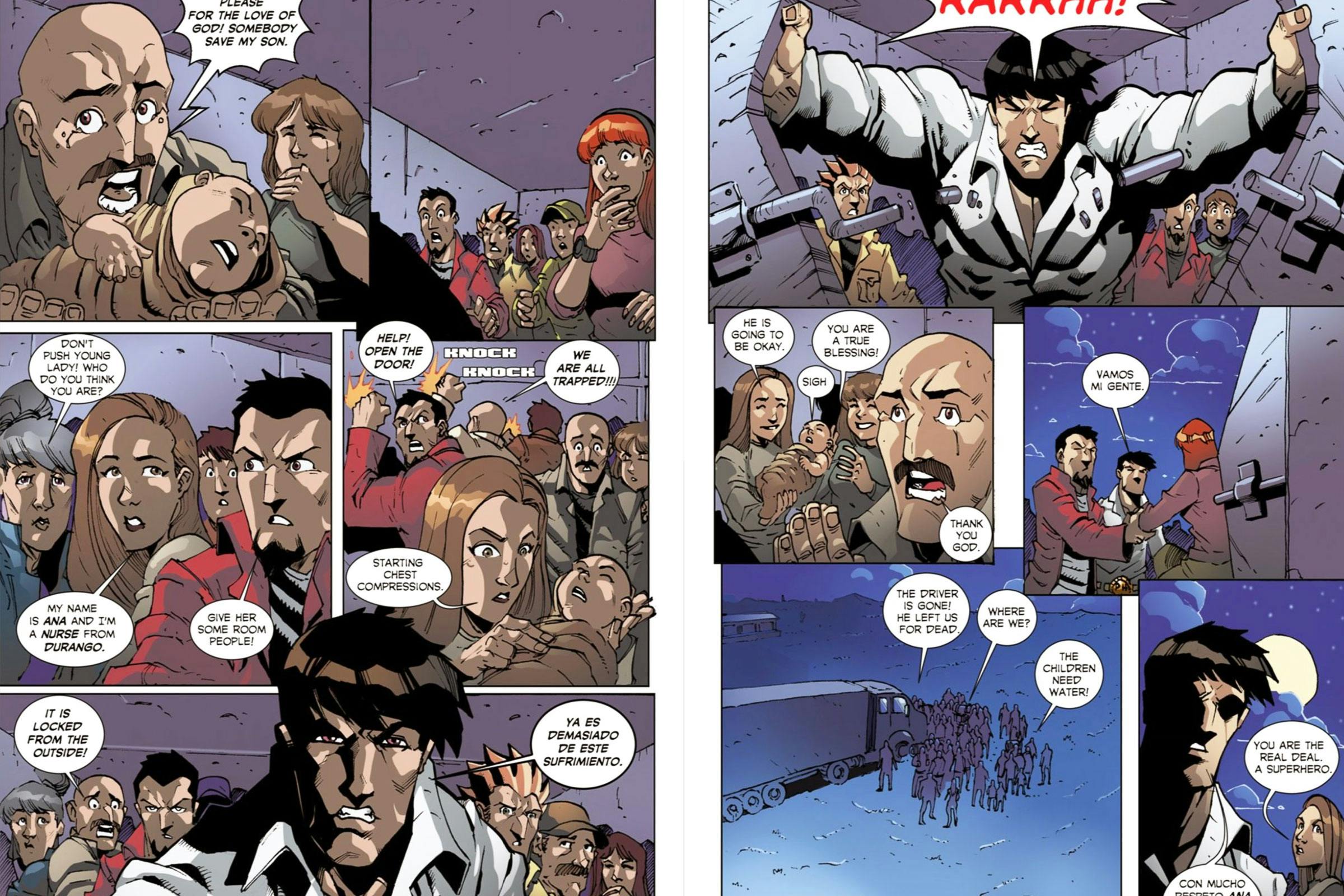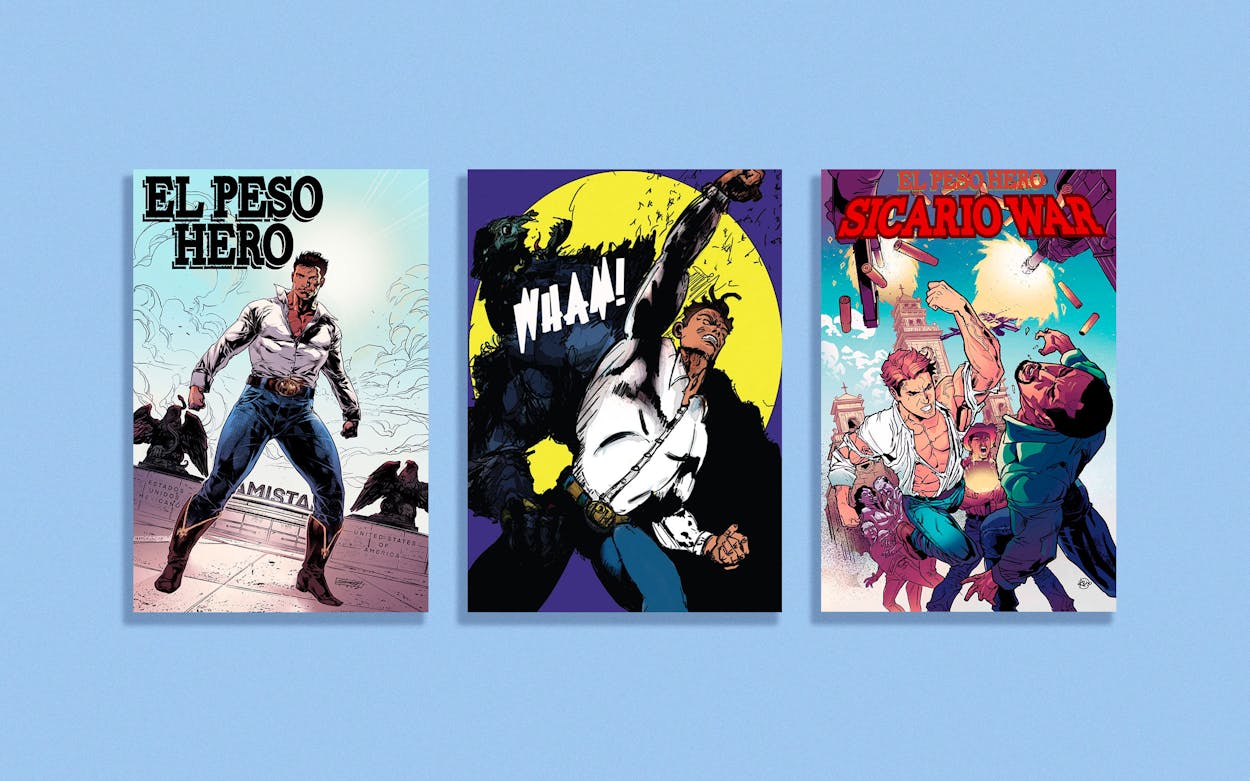A group of migrants have been driven into the desert, locked in the back of an eighteen-wheeler, and left for dead. The air inside the truck starts to run out. They begin to panic. A baby stops breathing. A nurse desperately tries CPR, but she’s running out of time. Then a mysterious man rips the metal door apart with his bare hands, and everyone is saved. The migrants call him a hero, but he answers, in Spanish, that the only hero is the nurse who helps the baby start breathing again.
The same man brushes off a hail of bullets while preventing a cartel bloodbath in Nuevo Laredo. He even fights La Lechuza, the legendary creature of Tejano folklore whose leathery wings and razor-sharp claws have haunted nightmares for generations. In the face of a pandemic, the same man hands out protective masks to farmworkers, first responders, and delivery drivers; he even uses his super strength to push a truck that’s run out of gas, then carries a few boxes of watermelons so the farmworkers don’t fall behind.
Who is this mysterious man who has been spotted throughout northern Mexico and South Texas? Does he wear a cape? Does he have a suit of high-tech armor?
Not quite. Emerging from the desert is a man who, well, looks like the kind of guy who enjoys sipping Tecate while browsing a Sunday flea market with his family. This superhero’s costume is a long-sleeved, white button-up shirt and blue jeans tucked into brown cowboy boots. Around his waist is a leather belt with a large brass buckle that has “P.H.” stamped into its center.
There has never been a superhero like Hector Rodriguez’s Ignacio Rivera, a.k.a. El Peso Hero, and there’s never been a comic book quite like El Peso Hero, which is written in both Spanish and English. While growing up in Eagle Pass and College Station, Rodriguez devoured comic books, but there was always something missing. “I like Superman and Batman and whoever, but they never really spoke to me personally,” he says. “You never see them speak Spanish or eat menudo or empanadas. Culturally, they were never part of my world.” Then, in 2003, upon hearing that cartel violence was escalating in northern Mexico, Rodriguez had an idea. “I thought it would be amazing if there was a norteño superhero. Someone who dresses up like my tío, in a very simple outfit, white shirt and cowboy boots, but fighting these narcos.”
Rodriguez would keep sketching and writing about his norteño superhero, but he never submitted his creation to any comic book publishers. It wasn’t until he became a type of superhero himself that he finally decided to show his creation to the world.

“In 2010, I became a bilingual educator in the Dallas Independent School District,” Rodriguez says. “My students are majority Latino and I have a huge sense of responsibility. As soon as the door closes, their future is solely rested on my shoulders. If they need help, how far can I push them?”
At the best of times, teachers aren’t expected only to teach. They’re also expected to be counselors, social workers, nutritionists, and a shoulder to cry on. “My first year teaching, one of my fourth-grade students came in crying. I asked him, ‘Mijo, what’s wrong?’ He said, ‘They took my dad. La Migra took him.’ The reality hit me,” Rodriguez says. “That’s when I said, ‘El Peso Hero needs to happen.’”
Rodriguez wanted to give his students a hero they could connect to, so he started self-publishing El Peso Hero in the summer of 2011. Nine years later, the story stretches across eleven books, with more on the way, and a major Hollywood production is in the works.
El Peso Hero is not only one of the few Latino superheroes in comics, but most of the “villains” he faces are all too real. In fact, it’s a U.S. Border Patrol agent who gives him his Spanglish nickname. The agent compares him to the devalued Mexican peso as a way of diminishing his heroism; our superhero chooses to reclaim the term and embrace it as his own. He fights cartels and political corruption, he helps families safely cross the border, and he liberates families from immigrant detention centers.
Despite the main character’s super strength and bulletproof skin, in many ways the world of El Peso Hero is as realistic as our own. This realism is on no better display than in Rodriguez’s latest book, El Peso Hero: The Essentials, which is available for free from the Rio Bravo Comics website.
In March, as the coronavirus pandemic was spreading around the world, fans asked Rodriguez what El Peso Hero would do about the virus. Rodriguez admits he was initially stumped by the question: “I felt almost powerless, because this was a huge world event that revolved around fighting an enemy that’s completely microscopic.” His bulletproof hero couldn’t punch the virus out, but Rodriguez knew the character would do something. “Seeing this huge problem that’s affecting a lot of people speaks to Ignacio’s vulnerability as a human. He is able to deflect bullets, but his heart, his soul, his conscience is very vulnerable.”
In The Essentials, Ignacio helps first responders, farmworkers, and those in the service industries who are struggling to provide for their families during the pandemic. For Rodriguez, these essential workers aren’t just people in the background. “That’s our community. That’s my students’ parents. They don’t have the luxury to work from home. They have to go show up and do the best they can.”
Hector Rodriguez himself keeps showing up. Not only is he using Zoom to teach his fifth-grade bilingual education classes for McKinney ISD, but he’s still organizing this year’s Texas Latino Comic Con, which has taken place in Dallas for the past four years. Rodriguez started the convention, which is one of only a handful of comic book events in the nation focused on Latino creators. Set to take place on Saturday, September 26, across several social media platforms, the convention will feature ten artists and multiple special guests. This year’s event will also honor the twentieth anniversary of Hector Cantú and Carlos Castellanos’s Baldo, the first syndicated comic strip created by Latinos and featuring a Latino family.
Rodriguez takes pride in the convention’s ability to celebrate new comic book writers and artists who might not feel as welcome in traditional comic book conventions. “We give that platform to uplift voices in the community that wouldn’t normally be heard,” he says.
One project featured at a previous Texas Latino Comic Con is Silent Meat Grinder, written by Hector’s late brother, Edgar Rodriguez. Edgar’s comic is a sci-fi epic about a veteran in the future who is haunted by PTSD. “I come from a military family and had two great-uncles who fought in World War II,” Hector says. “One of them was diagnosed with shell shock, and Edgar wanted to write a story dealing with that and that also had a Latino lead.” Edgar passed away this year at 32 years old, but Hector is determined to finish the comic book scripts his brother left behind. Hector is also putting the finishing touches on Rosa American Dream and Last Latinx, which is about an epidemic that turns non-Latino people into monsters.

Next year is the tenth anniversary of El Peso Hero, and there is a lot more on the way. Not only does Rodriguez plan to launch a new story arc, but there is also a film project in development. The film is spearheaded by Javier Chapa of Mucho Mas Media and is being written by Sean Tretta, who was a writer for FX’s Mayans M.C. Eli Roth, director of Hostel, is also involved as a producer, while Jay Hernandez (Magnum P.I.) is attached to star.
Rodriguez had been approached by several filmmakers over the years, but says this is the first time he felt like the producers really understood the character. He described the project as truthful to the border world and tonally similar to the film Logan, but with its heart set in the Southwest. Javier Chapa particularly connected to the idea. “Having grown up on the South Texas border, I was immediately drawn to and could relate to the characters, themes, and stories of El Peso Hero,” Chapa says. “Storytelling should reflect the world we live in, and El Peso Hero does that, but in a mainstream way with themes and issues ripped from our headlines. Hector has created a unique Latinx hero and world that uniquely embodies what is currently happening on the border.”
On August 3, 2019, a tragedy happened in El Paso that even a superhero would have had trouble stopping. A man armed with semi-automatic weapons drove from the Dallas area to El Paso in order to kill as many Latino people as he could. That attack, which was the largest massacre of Latino people in American history, still haunts and motivates Rodriguez.
“The guy who did the El Paso shooting lived something like five miles from me. The shooting happened days after Texas Latino Comic Con, which gives me chills,” Rodriguez says. “While I’m there uplifting the community, across the highway the complete opposite is happening. Someone is planning evil on a horrific scale.”
Much like Ignacio, Rodriguez is doing the best he can in the face of the pandemic. He can’t stop bullets, but he can make sure voices from his community are being heard. “It gives me more sense of purpose when something like [the El Paso shooting] happens,” he says. “The best we can do is tell stories about those people.”
Does he dream of leaving the classroom to focus on comics full-time? Not anytime soon, and especially not during the pandemic, Rodriguez says. “Being an educator and supporting my students is my best work,” he says. “I’ve had opportunities to focus on my craft, but right now it’s all hands on deck. My students need me.”
- More About:
- Books






